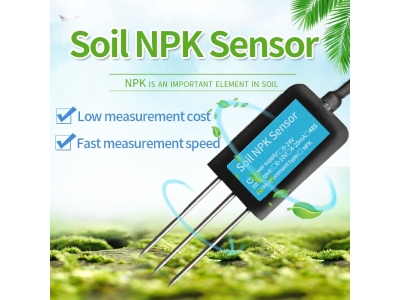
What is a soil nutrient detector?
A soil nutrient detector is a tool that helps analyze and measure the nutrient content in the soil, providing valuable information for effective soil management and fertilization practices.

A soil nutrient detector is a tool that helps analyze and measure the nutrient content in the soil, providing valuable information for effective soil management and fertilization practices.
Soil is a vital resource for agriculture and plays a crucial role in supporting plant growth and food production. The fertility and nutrient content of the soil directly impact the quality and yield of crops. Thus, monitoring and understanding the nutrient levels in the soil is essential for farmers and agronomists. A soil nutrient detector is a tool that helps analyze and measure the nutrient content in the soil, providing valuable information for effective soil management and fertilization practices.

What are Soil Nutrient Detectors?
Soil nutrient detectors, also known as soil nutrient analyzers, are portable devices designed to measure the concentration of various nutrients in the soil. These devices utilize different measurement techniques, such as spectroscopy, electrochemical analysis, and optical sensors, to determine the nutrient levels accurately. They provide real-time data, allowing farmers to make informed decisions about fertilization, irrigation, and crop management.
The Working Principle of Soil Nutrient Detectors:
Different types of soil nutrient detectors employ different technologies to measure nutrient levels. Here are a few commonly used techniques:
1. Spectroscopy:
Spectroscopy-based soil nutrient detectors use light absorption and reflection to analyze the nutrient content in the soil. These devices emit light of various wavelengths onto the soil sample and measure the reflected light. The reflected light spectrum provides information about the presence and concentration of different nutrients, such as nitrogen, phosphorus, potassium, and organic matter.
. Electrochemical Analysis:
Electrochemical-based soil nutrient detectors measure the concentration of ions in the soil solution. These devices consist of ion-selective electrodes that selectively react to specific ions present in the soil. By measuring the electrical potential difference generated during the reaction, the device determines the concentration of ions such as calcium, magnesium, and chloride.
3. Optical Sensors:
Optical sensors are used in some soil nutrient detectors to measure specific nutrient concentrations indirectly. These sensors analyze the color or fluorescence properties of the soil, which are indicative of nutrient levels. For example, nitrogen sensors measure the chlorophyll content in the soil, as chlorophyll is an essential component for plant growth and photosynthesis.
Applications of Soil Nutrient Detectors:
1. Precision Agriculture:
Soil nutrient detectors are widely used in precision agriculture to optimize crop management practices. By accurately measuring nutrient levels in the soil, farmers can apply fertilizers more efficiently, avoiding under or over-fertilization. This leads to increased crop productivity, reduced environmental impact, and cost savings.
2. Soil Fertility Assessment:
Soil nutrient detectors help agronomists assess the fertility of the soil and identify nutrient deficiencies or excesses. With this information, appropriate soil amendments can be applied to improve soil quality and enhance plant growth. Regular soil testing with nutrient detectors enables farmers to monitor soil health and ensure optimal nutrient balance for sustainable agriculture.
3. Nutrient Management:
Soil nutrient detectors aid in making informed decisions about nutrient management. By analyzing the nutrient levels in different areas of the field, farmers can apply site-specific fertilization, adjusting nutrient application rates based on the specific needs of each soil section. This targeted approach maximizes nutrient utilization and reduces the risk of nutrient runoff into water bodies.
Advantages and Limitations of Soil Nutrient Detectors:
Advantages:
- Quick and real-time analysis of soil nutrient levels
- Portable and easy to use devices
- Cost-effective compared to traditional laboratory-based soil testing
- Enables precision agriculture and site-specific nutrient management
- Facilitates data-driven decision-making for better crop productivity
Limitations:
- Calibration and maintenance requirements for accurate measurements
- Soil characteristics and properties may affect measurement accuracy
- Limited in measuring certain nutrients, requiring additional laboratory analysis
- High initial investment cost for advanced soil nutrient detectors
Conclusion:
Soil nutrient detectors are valuable tools for farmers and agronomists in managing soil fertility and optimizing crop production. They provide fast and accurate measurements of nutrient levels, enabling precision agriculture practices and site-specific nutrient management. Regular soil testing with nutrient detectors helps ensure optimal soil health and nutrient balance, leading to improved crop productivity and reduced environmental impact. As technology continues to advance, soil nutrient detectors are expected to become more accessible, affordable, and user-friendly, further revolutionizing the field of soil management and agricultural practices.